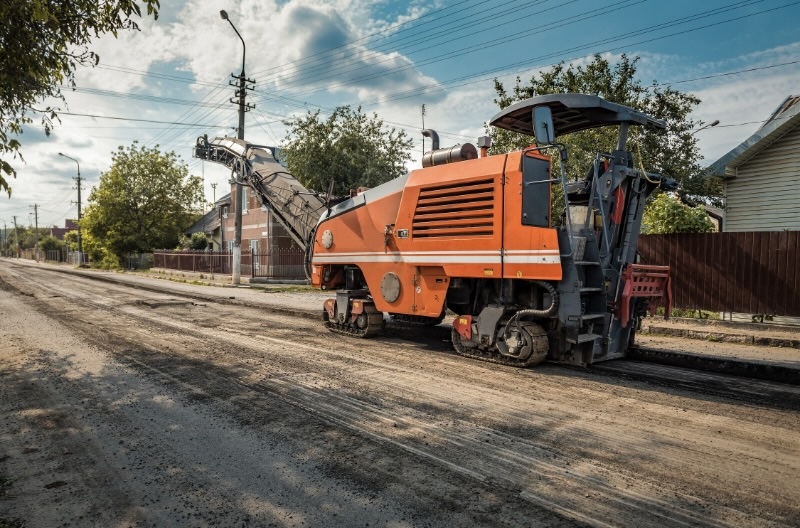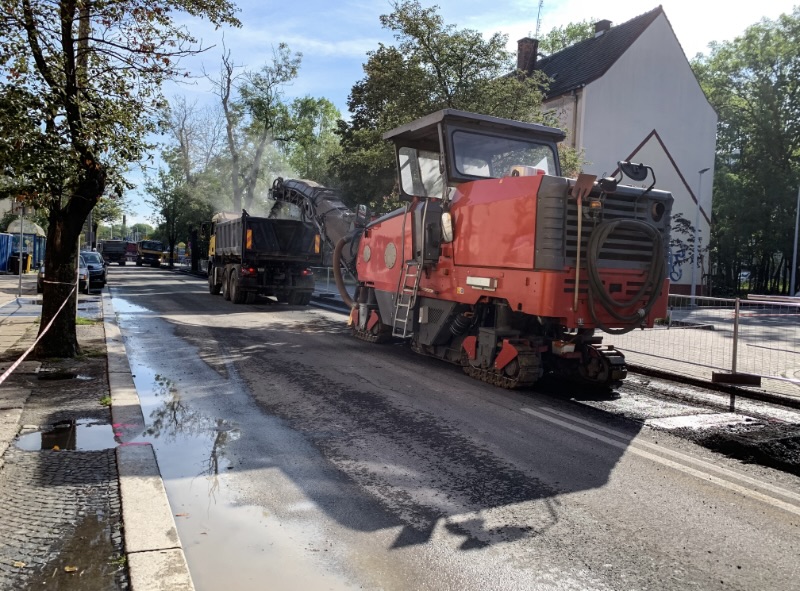Nashville Asphalt Milling: A Comprehensive Guide to the Process and How It Works
Table of Contents
ToggleAsphalt milling is a method that utilizes a particular machine, a piece of powerful milling equipment, to remove the top layer of asphalt from a paved surface. It skillfully scrapes away to achieve just the right thickness to make the surface rough, achieving an ideal state for subsequent processes. Contrary to some beliefs, this procedure is both random and destructive. Instead, it prepares the ground for quality resurfacing or repair work, ensuring that a binder is applied, and the new flood of asphalt adheres securely. Now, imagine the ponderous machine patiently and thoroughly grating the road surface, the dull roar filling the air with a sense of purpose and renewal – that’s asphalt milling for you. After all this effort, the stage is set for further improvements.
Asphalt milling involves the removal of a layer of asphalt from the surface to a specified thickness using specialized milling machines. This process effectively restores the underlying surface and prepares it for resurfacing, resulting in a smoother, more even pavement.
Understanding Nashville Asphalt Milling
Imagine your old asphalt pavement as a rugged and bumpy road – potholes, cracks, and irregularities everywhere; not something you want to keep around. This is where asphalt milling comes in. With specific milling equipment, it’s the makeover your asphalt surfaces deserve. The process doesn’t involve scraping off the top layer, but carefully removing a precise depth of the existing asphalt.
By doing so, you’re getting rid of surface imperfections and preparing the pavement for a fresh new layer that’ll ensure your road or driveway stays strong and smooth for years to come.
For a tangible comparison, think of it like this: Just as you smooth out all the bumps and cracks on a wall before painting it, asphalt milling creates a clean canvas for roads and parking lots. It’s about achieving a clean slate before applying new layers of asphalt, using an effective binder to secure this new layer.
The Importance of Precision
A key aspect of Nashville asphalt milling is precision. The milling equipment used in this process grinds away the top layer with accuracy, creating a roughened surface that provides an ideal grip for the new layer of pavement. This particular thickness is determined by specific requirements, such as preparing the surface for resurfacing or adjusting the grade or slope to improve drainage.
From an engineering standpoint, precision in milling ensures uniformity and consistency across the entire surface, reducing the likelihood of cracks, unevenness, and other structural defects in the new pavement.
This precision sets the foundation for the new pavement. If the milled surface isn’t level or smooth enough, it can affect the quality and longevity of the freshly laid asphalt.
In essence, Nashville asphalt milling is more than just scraping off old pavement – it’s about restoring stability and durability to the roadway that promises a smoother, safer ride for everyone who uses it.
Smooth rides and well-maintained roads are crucial for safe and efficient travel. Now, let’s explore the purpose and advantages of asphalt milling.
Purpose and Advantages of Asphalt Milling
Nashville asphalt milling isn’t just about shaving away the damaged surface of a road; it has many purposes and advantages that make it an essential part of pavement maintenance.
Extend Pavement Lifespan
One of the key benefits of Nashville asphalt milling is its ability to remove deteriorated and damaged asphalt, ultimately extending the life of the pavement structure. By removing the worn-out top layer, milling creates a clean slate for fresh pavement application, providing a sturdy foundation for future layers. With the help of binders and appropriate thickness, the pavement lasts. Asphalt milling, a process in which a cold planer is used to remove damaged layers of the roadway, is crucial in preventing further deterioration and maintaining the overall integrity of the roadway over an extended period.
To put it into perspective, imagine it as peeling off old, chipped paint from a wall before applying a fresh coat—it’s about creating a smooth and durable surface that allows new materials to adhere effectively, ensuring longevity and durability for years to come, much like consistent pavement projects.
Cost-Efficiency
Apart from enhancing pavement longevity, Nashville asphalt milling is also a cost-effective alternative to complete pavement replacement. Instead of tearing out the entire asphalt surface, which can be extremely costly and time-consuming and require dump trucks, milling targets only the damaged layer. This targeted approach reduces material and labor costs and ensures minimal disruption to traffic flow during repairs.
By selectively removing deteriorated areas, milling optimizes the use of materials while addressing specific concerns within the pavement structure—an efficient, cost-saving strategy that benefits both roadway maintenance budgets and overall project timelines.
Asphalt milling is all about precision—removing only what’s necessary to achieve optimal results with minimal waste. Like a well-utilized dump truck, it only removes the loads required, reducing waste.
Smooth Surface Preparation
In addition to structural improvements, asphalt milling also provides a remarkable aesthetic advantage—a smooth, even surface for new pavement applications. This level surface not only enhances driving comfort and safety but also improves the overall parking experience for vehicles. A well-executed milling process ensures that the fresh layer of pavement will be applied evenly across the entire surface, reducing potential hazards or unevenness that could lead to future damage.
Picture driving on a freshly milled and repaved road—a seamless, bump-free experience that promotes safety and accessibility for all drivers and pedestrians.
Environmental Benefits
Furthermore, Nashville asphalt milling offers significant environmental benefits by generating reusable materials and reducing waste sent to landfills. The reclaimed asphalt can be recycled and used in new pavement projects, minimizing the need for additional raw materials. Additionally, reducing landfill deposits contributes to environmental sustainability, making asphalt milling an environmentally friendly approach to pavement maintenance.
By repurposing reclaimed asphalt, milling minimizes the demand for new materials, conserving natural resources while reducing environmental impact—a sustainable solution that aligns with modern environmental initiatives and regulations.
Understanding these pivotal purposes and advantages underscores why Nashville asphalt milling is an essential practice for preserving and enhancing our roadway infrastructure cost-effectively and environmentally responsibly.
Applications and Environments for Asphalt Milling
Nashville asphalt milling is far from a one-size-fits-all solution; it’s versatile. One of its primary applications is for road resurfacing and repair. When roads develop surface damage or irregularities due to wear and tear, weather, or heavy traffic, milling is an effective way to restore smooth, even surfaces, preventing further deterioration and making the roads safer.
Consider a road riddled with potholes, cracks, and rough patches—milling can swiftly eliminate these problems. After the cold planer grinds away the damaged layers of asphalt, a dump truck can carry away the debris, and smoothness is restored, improving the overall driving experience and extending the life of the road. This process forms part of several pavement projects aimed at improving road conditions.
Imagine taking a leisurely drive down a freshly milled road—gone are the jarring bumps and unsettling vibrations. This is thanks to road milling, a technique that feels as if it’s ironed out the width of the asphalt, making the ride smooth once more. It’s an operation that enhances safety and comfort for all drivers, cyclists, and pedestrians who use that road.
Shifting from roads to parking lots, pavement milling plays a crucial role in parking lot maintenance. With constant exposure to a steady stream of vehicles and varying weather conditions, parking lots can develop uneven surfaces over time, impacting visual appeal and safety.
Property owners ensure that their visitors have a smooth surface for parking and maneuvering around by employing asphalt milling as part of parking lot maintenance routines. Additionally, regular application of milling techniques helps prolong parking lots’ lifespan, reducing the need for extensive repairs in the future.
Picture a well-maintained parking lot where cars move effortlessly through well-defined lanes without jolts or bumps. Thanks to precision road milling techniques applied to the full width of the parking area, it creates a safe environment for both drivers and pedestrians, enhancing the overall experience for everyone who uses it.
Parking lot milling doesn’t just benefit roads and parking lots; driveway rehabilitation is another area where milling proves invaluable. Over time, driveways can deteriorate due to constant use, exposure to the elements, or improper installation. With milling techniques tailored to rejuvenate these surfaces, homeowners can revitalize their driveways, considerably improving both safety and aesthetic appeal.
By removing worn-out layers of asphalt and addressing underlying issues such as drainage problems or structural damage, driveway milling allows homeowners to regain a sturdy and visually pleasing entrance to their homes.
Now having explored some typical applications for milling like road milling and driveway milling, let’s examine how this process can be modified to respect environmental regulations in various settings from bustling urban areas to serene suburban neighborhoods.
Technique and Equipment in Asphalt Milling
Asphalt milling entails the use of specialized machinery designed to remove layers of asphalt efficiently. The primary equipment crucial to this process is the milling machine, equipped with rotating cutting teeth that grind and remove the asphalt surface to the specified depth. It is a powerful precision tool tailored specifically for this task and can adapt to roads of various widths.
Modern milling machines are also equipped with advanced controls that allow for precise adjustments to the milling depth. This ensures accuracy in the removal process and enables contractors to achieve the desired milling depth with precision.
The control of milling depth is crucial for achieving optimal results. It’s akin to trying to sculpt a piece of pottery without control over the depth and spacing of the tools. Without precision, it would be impossible to create anything recognizable or precise. Similarly, in asphalt milling, adjusting and maintaining precise control over the depth of material removal is vital for creating a smooth, uniform surface.
Some advanced milling machines feature water spraying systems that serve a dual purpose: they suppress dust generated during the milling process, contributing to a safer and cleaner work environment, while also cooling the milled material to prevent damage to both equipment and material, thereby improving overall efficiency and quality of work.
Advantages of Water Spraying Systems
- Enhanced safety conditions for workers by reducing dust particles
- Lower risk of fire hazards associated with airborne particles and hot asphalt milling operations
Implementing water spraying systems demonstrates a commitment to worker safety and environmental responsibility. By using these advances and considering width considerations, pavement milling can be a highly efficient and effective process across various applications. By delving into the depths of dust control and maintaining appropriate temperature controls, these systems significantly contribute to creating a more controlled and safer working environment.
With a deep understanding of the machinery involved in asphalt milling and its associated safety measures, we’re now prepared to traverse the depths of a step-by-step guide to the asphalt milling process.
Step-by-Step Guide to the Asphalt Milling Process
When repairing or renewing paved surfaces, the asphalt milling process is critical in preparing the pavement for a fresh start. Thus, let’s journey into the depths of the essential steps from surface preparation to cleanup, paying meticulous attention to every significant detail.
Surface Preparation
Surface preparation is a lot like getting ready to paint. You wouldn’t just dive into the depths of painting without ensuring the area is clean and smooth, right? Similarly, before milling begins, the site must be cleared of obstacles, debris, and anything else that might get in the way. This ensures a smoother and safer milling process.
Not only does this make milling easier and more efficient, but it also helps maintain safety on-site. By removing any objects or debris that could cause accidents or damage equipment during milling operations, you’re laying the groundwork for a productive and safe work environment.
Milling Operations
Now that the area is prepped, it’s time for the star of the show – the milling machine. This heavy-duty piece of equipment is designed to remove the top layer of asphalt to a specified depth, creating a textured surface as it goes. Imagine it like delving into the depths of an old, worn-out layer to reveal a fresh surface underneath.
The depth of asphalt removed during milling depends on several factors, such as the depth of the existing pavement, the desired finished surface height, and any underground utilities. The goal is to create a level base for new layers of asphalt while also addressing any irregularities or damage present in the existing pavement.
Inspection and Cleanup
Once the milling operation is complete, it’s time for a thorough inspection. This step ensures that the desired depths have been achieved uniformly across the milled area and that the quality meets the required standards. Any remaining debris from the milling process is also cleared before proceeding to subsequent pavement procedures.
Inspecting the milled surface is crucial because it allows one to identify any irregularities or issues that may need further attention before proceeding with additional pavement layers. This attention to detail helps maintain the integrity and longevity of the newly laid asphalt surfaces.
Following these steps meticulously sets the stage for seamless pavement renewal, ensuring that each phase flows smoothly into the next. The careful balance between precision and efficiency at every stage leads to durable, high-quality paved surfaces that stand the test of time.
Disposal and Recycling of Milled Asphalt
Disposable and recycled milled asphalt are pivotal in promoting sustainable construction practices. Whether in the pavement’s depths or on the surface, repurposing milled asphalt offers a significant advantage by reducing the need for raw materials for new pavement and other construction applications.
This approach ensures that existing milled asphalt from previous projects can be utilized in new construction, conserving natural resources and lessening the environmental impact of sourcing and transporting new materials.
Proper management of milled asphalt waste ensures environmental compliance, aligning with regulations and standards to foster eco-friendly pavement maintenance practices. By adhering to these guidelines, construction endeavors can contribute to sustainable development by minimizing their ecological footprint.
In addition to being environmentally compliant, recycling milled asphalt substantially reduces waste directed to landfills, supporting a more responsible approach to construction and maintenance activities. By minimizing waste material sent to landfills, environmental strain is reduced while more efficient use of available resources is promoted.
Considering these environmentally conscious practices when dealing with milled asphalt is essential.
It becomes clear that repurposing and recycling milled asphalt offers numerous advantages, including reducing the use of raw materials, adhering to environmental regulations, and contributing to waste reduction. This highlights the critical role of proper disposal and recycling within the asphalt milling process.
Recycling milled asphalt is not just a cost-effective solution; it also helps protect the environment and promote sustainable construction practices. Contact Gaddes Strategic LLC at (615) 866-2795 or through our website to learn more about our sustainable paving solutions and contribute to a greener future.


